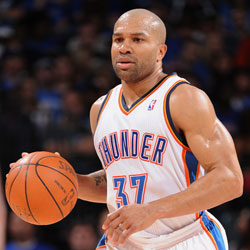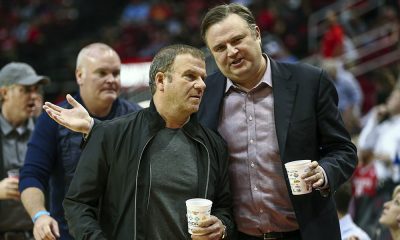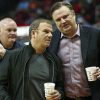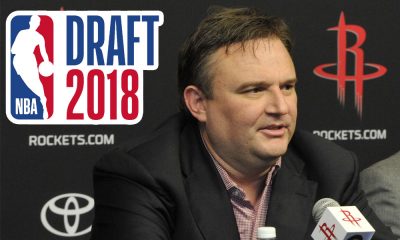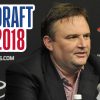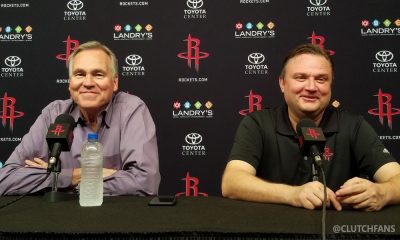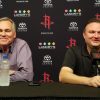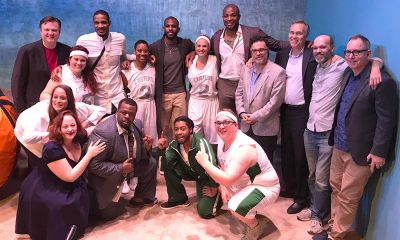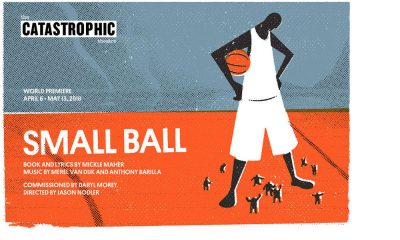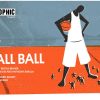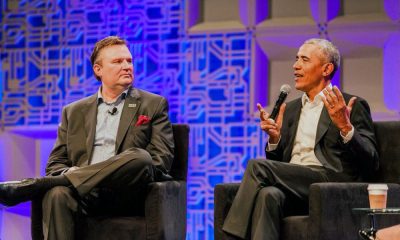Houston Rockets
Houston Rockets Salary Cap Update
Now that the March 15th trade deadline has passed, let’s take a look at the Houston Rockets salary cap situation heading towards the 2012 NBA Draft and the 2012 offseason.
Published
13 years agoon
Now that the March 15th trade deadline has passed, let’s take a look at the Houston Rockets salary cap situation heading towards the 2012 NBA Draft and the 2012 offseason.
The Rockets’ Latest Moves
Since my last update, the Rockets have made the following roster moves:
- The Rockets waived Jeff Adrien prior to his contract becoming fully guaranteed.
- The team signed Greg Smith on February 8 to a three-year deal for the league minimum. The deal was fully guaranteed for this season, is 50% guaranteed for 2012-13 and is non-guaranteed for 2013-14.
- At the trade deadline, the Rockets traded Hasheem Thabeet, Jonny Flynn and Minnesota’s 2012 second round pick (previously acquired with Flynn during last year’s draft) to the Portland Trailblazers in exchange for 6-11 center Marcus Camby.
- Also at the trade deadline, the team traded Jordan Hill to the Los Angeles Lakers in exchange for Derek Fisher and the Dallas Mavericks’ 2012 first round pick. The pick from the Mavericks (previously acquired by the Lakers in the Lamar Odom trade) is top-20 protected through 2017 and then becomes fully unprotected in 2018.
- On March 16, the Rockets waived Terrence Williams.
- On March 17, the team signed Courtney Fortson to a 10-day contract.
- On March 19, the team reached a buyout agreement with Fisher.
The Derek Fisher Buyout: Cap Consequences
Whether it was due to Fisher’s altruism or Daryl Morey’s hard-line stance in negotiations (or both), the Rockets ended up making out like bandits with Fisher’s buyout agreement. Fisher elected to leave his entire 2012-13 salary ($3.4 million) on the table and to walk away from Houston, choosing instead to seek a key bench role on a title contender (which, sadly, the Rockets currently are not). Shortly after clearing waivers, Fisher signed with the Oklahoma City Thunder.
However, due to league rules, Fisher was technically not allowed to waive his 2012-13 player option.
The most likely reason for the league’s denial of Fisher’s waiver of his player option may have been that Fisher’s contract included a set window during which his player option either be invoked or waived; and since this window had not yet opened, Fisher was not permitted to take any action with respect to his option. Furthermore, league rules prohibit a team and its player mutually amending a player contract if the end result is to shorten the length of that contract, so Fisher and the Rockets could not even mutually agree to the waiver of the player option. While the parties theoretically could have mutually agreed to eliminate the OPTION (making Fisher’s 2012-13 year fully guaranteed), they could not have eliminated the YEAR on his contract. (Many thanks to Larry Coon for guidance on these technical contractual issues.)
So, rather than waive his option, Fisher and the Rockets agreed that Fisher’s buyout amount would be the equivalent of the remainder of his 2011-12 salary, which was then allocated across this year and next in proportion to what his remaining salary would have been had he not been bought out and had instead exercised his player option. Since most buyouts do not include a setoff right for any additional salary the player makes on a new team — as opposed to the setoff typical for most waived players who are not bought out — Fisher’s new salary with Oklahoma City was not subtracted from (or “set off” against) the Rockets’ salary obligations. And even had there been a setoff, it would not have affected the Rockets’ cap numbers; it would only affect salary paid.
The result? The Houston Rockets will take a salary cap hit of $644,005 in 2012-13.
This is an almost negligible amount. To put it in perspective, the league minimum salary for a player with only one full year of NBA experience is $762,195. Given the Rockets’ penchant for making moves to gain further cap flexibility, this cap hit is rather inconsequential.
So, after the dust had settled on the Fisher trade and buyout, for the burden of taking this insignificant cap hit next season, the Rockets in essence paid almost nothing for a first round draft pick likely to be in the early 20s. By comparison, most first round picks in that range cost a minimum of $3 million cash, if not the inclusion of future second round picks or the obligation of taking on a bad contract (like Fisher’s, had he not left so much money on the table).
I know it’s not the home run that we were all hoping for, but this trade turned out to be one hell of a deal for the Houston Rockets.
Summer of 2012: Options, Options, Options
Barring any further roster moves, the Houston Rockets will have a minimum of approximately $35.01 million in salary commitments to six (remaining) players for the 2012-13 season: Kevin Martin ($12.44 million), Luis Scola ($9.41 million), Kyle Lowry ($5.75 million), Patrick Patterson ($2.10 million), Marcus Morris ($1.91 million), Chandler Parsons ($888,250), Fisher’s buyout ($644,005), a waived Samuel Dalembert ($1.5 million partial guarantee) and a waived Smith (about $381,000).
However, it is highly likely that the Rockets exercise the fourth-year option on Chase Budinger for the league minimum salary of $885,120. It is also very likely that the Rockets will not waive Smith, since the additional amount he’d be owed if not waived would be less than the amount of a roster charge (should the Rockets have fewer than 12 players otherwise counting against their cap). Add to that the rookie scale cap hold for Donatas Motiejunas ($1.13 million), who will likely be coming over next season, and the Rockets’ total salary commitments increase to about $37.41 million for nine players.
Between the Rockets’ lack of other centers (Camby will be a free agent this summer) and the fact that he can walk and chew gum at the same time, it is probable that Dalembert will not be waived and that his full $6.7 million salary counts against the Rockets’ cap this summer. That puts the Rockets’ cap figure at $42.61 million for ten players. (NOTE: I believe the Rockets have until July 8 to waive Dalembert without guaranteeing his entire salary; so there may be the possibility that a trade could be worked out during the July Moratorium with Dalembert being shipped elsewhere on July 8 for salary-matching purposes or as an attractive financial asset, with the acquiring team either keeping him or waiving him immediately in a salary dump. See my previous analysis of Dalembert’s contract)
Restricted free agent Courtney Lee will have a cap hold of about $5.56 million (more details on Lee’s free agency can be found here); and Goran Dragic, an unrestricted free agent, will have a cap hold of about $4.01 million (details on Dragic’s free agency here). With these additions, the Rockets’ total salary commitments further increase to $52.18 million for twelve players.
Based on next season’s salary cap figure ($58.044 million, at which the salary cap will be artificially set before resetting based on the new BRI split in 2013), in order for the Rockets to maintain rights to their current players, they will have approximately $5.87 million in salary cap room.
That’s without taking into account (a) re-signing Camby, (b) the cap holds for the Rockets’ 2012 first round picks and (c) the increased cap figure for Motiejunas if the team signs him to 120% of his rookie scale salary in order to get him into summer league before the start of 2012 free agency. If, for example, the Rockets and the New York Knicks both miss the playoffs, Dallas secures a top-10 record, the Rockets end up with the # 11, # 14 and # 22 picks, and if the team signs each of those players and Motiejunas to 120% of their rookie scale salaries in order to get them into summer league play on time, then the Rockets would be left with only a negligible amount of available cap room with their current set of players (less than $440,000).
Before anyone beats his/her head against a wall, decrying that the Rockets won’t have any cap room after all, the Rockets can just as easily have plenty of cap room. If, for instance, the Rockets (1) make the playoffs, (2) timely waive Dalembert and (3) let Lee, Dragic and Camby walk in free agency, then their cap room with the current roster would jump up to about $17.03 million.
What this means is that the Rockets will be able to easily afford one maximum salary free agent… if they are willing (and, more importantly, able) to lure one to Houston. They are also in a flexible enough position that they can make some minor moves (e.g., trading Dalembert, packaging multiple 2012 first round picks to move up or down, or even paying another team to eat a small salary) in order to keep one or more of their free agents. Heck, if there just isn’t anything out there in free agency on which it’s worth using their cap space, the Rockets could even choose to bring back their free agents (assuming they can get them locked into reasonable deals) and save some cap room for 2013 (when Martin, Dalembert and others come off the books).
And almost none of this analysis takes into account that the Rockets will make trades. If the 2012 NBA Draft ends without the Rockets having made at least one trade, I will be shocked. A draft-day (or later offseason) trade of Martin or Scola could dramatically increase the Rockets’ available cap room to sign free agents or to provide further flexibility in future trades.
Conclusion
The Rockets have set themselves up nicely to make a run at a major acquisition next summer, either via free agency or via trade, by positioning themselves as one of several NBA teams that will have enough cap room to sign a maximum salary free agent. Or they can make some moves for the future while still preserving salary cap flexibility for 2013 and beyond. Or they can potentially add to their list of talented players on reasonably-priced deals if they retain Lee and/or Dragic, adding even more flexibility to trade other parts going forward in their pursuit of a star trade acquisition.
F-L-E-X-I-B- . . . well, you know the drill by now.
>> Comments
Houston Rockets
Looking Back on the Trade for Phoenix’s Draft Picks
Are the Rockets set to cash in on Phoenix’s downfall or could a Suns retool murky the waters?
Published
4 months agoon
March 12, 2025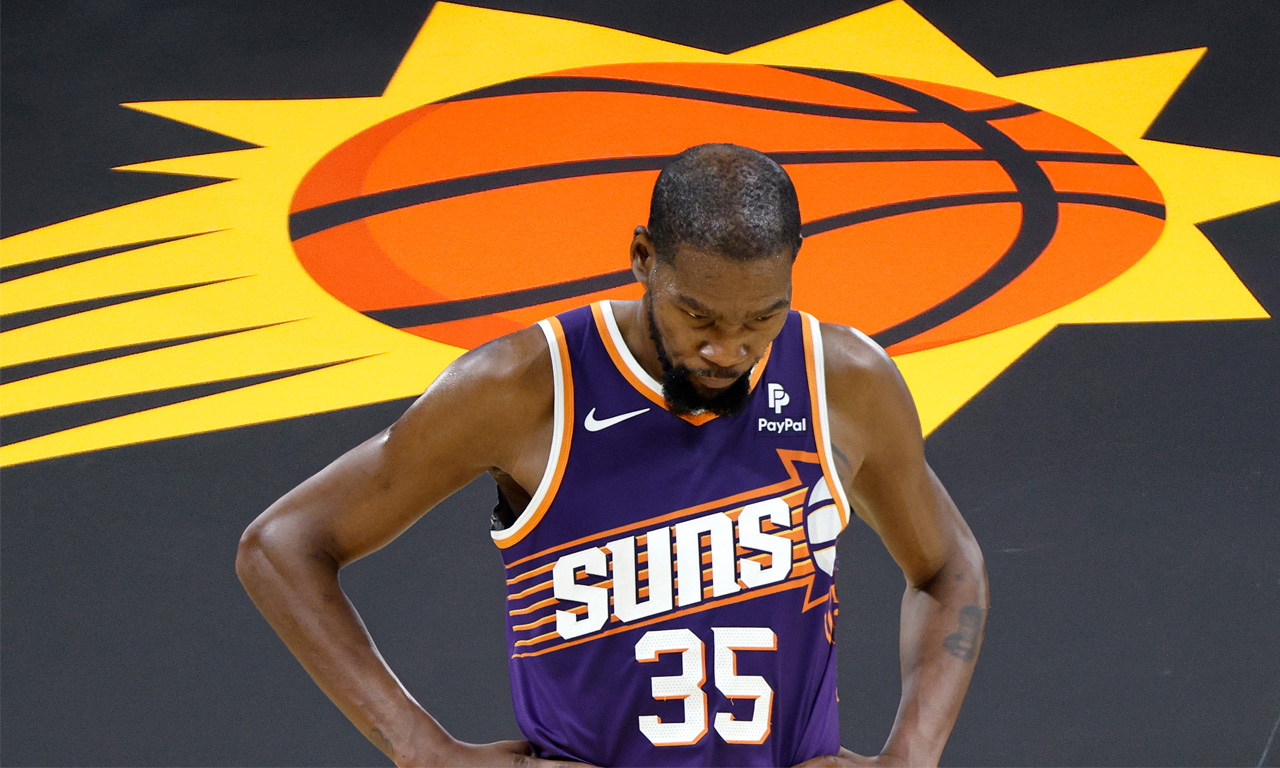
As the Houston Rockets set to host the Phoenix Suns tonight, it seems the right time to take a look back at the trade that linked these two franchises together for the foreseeable future.
This past June, the Rockets made a trade with Brooklyn that sent back to the Nets control of their 2025 and 2026 unprotected first-round picks. In exchange, the Rockets received a large chunk of Phoenix’s future (2025, 2027, 2029) and control of the Dallas Mavericks’ 2029 first.
In essence, the Rockets traded one pick and one swap for two picks and two swaps. All unprotected.
Thoughts At The Time of the Trade
If I’m going to discuss the current outlook of this trade, I have to be honest about how I saw it at the time of the move. While I didn’t hate this trade initially, I definitely didn’t love it either.
I liked that the Rockets increased their overall trade assets. I also liked that they extended the timeline to be able to make a bigger trade and I also appreciated that they kept control of the 2027 Brooklyn swap.
But I didn’t like that the Rockets gave up what seemed like the more established value (Brooklyn) for a more uncertain gamble (Phoenix). The Rockets did not control a “tanking runway” of picks to offer back to Phoenix — all of the picks Houston got in the deal were in staggered years (’25, ’27, ’29). I also felt Brooklyn, who badly needed to rebuild, got away with paying market value to get their picks back despite the fact that the Rockets invested years in watching those picks appreciate up to the point that they had the Nets completely over a barrel.
Net-net: I felt like more certainty was traded for less certainty and it was more of an equitable trade for both teams rather than Brooklyn paying dearly to get back the things only the Rockets could offer.
There were two ways I thought this trade could pay dividends: The Suns needed to flame out immediately, as in this season (unlikely), or the Rockets could trade all those pick assets as part of a deal for a real superstar in the next 12-18 months (more likely).
In a testament to how quickly change can occur in a very unpredictable NBA, four things have happened that have been positive indicators for the Rockets in making this move.
The Suns are fading
While Phoenix had major salary cap issues, dealing with the second apron, they didn’t appear to have problems on the court. They jumped out of the gate 8-1 and looked like a legitimate contender behind their star trio of scorers in Kevin Durant, Devin Booker and Bradley Beal.
Given Houston controlled Phoenix’s pick this year via a swap, it looked like the Rockets would come up empty-handed on the trade this season.
That changed quickly.
Injuries, serious depth concerns and a lack of a defensive identity has sent Phoenix spiraling. Booker’s availability has been inconsistent, forcing Durant to carry the load, while Beal has not quite fit in at all. Their financial limitations, thanks to owner Mat Ishbia’s all-in spending spree, have handcuffed their ability to improve the roster around the three stars.
The Suns are sitting 11th in the West, having gone 22-34 since that hot start, and are currently trying to catch a depleted Dallas squad to get back into the play-in picture.
As of right now, the Rockets project to end up with a lottery pick (albeit a late one) this season out of the trade.
Phoenix was caught shopping Durant
Because the Suns struggled so hard after the start, they tried to make a major move at the deadline but could not unload Beal, in large part due to his no-trade clause.
As a result, they may have made a misstep: They openly tried to trade Durant, which inevitably became public news.
Now? Durant will almost assuredly be traded this summer — likely to a destination that he handpicks. This means the Phoenix Suns will have to look at all possibilities for their future, including potentially having to give Rafael Stone and the Rockets front office a call.
But keep in mind, the Rockets can not offer Phoenix the ability to completely rebuild via the draft right now. Phoenix’s 2026 pick is controlled by Washington. They would have to get extremely creative to set that stage. A retool in Phoenix is much more likely.
Could Brooklyn have been better than expected?
This one is tougher to gauge.
The Brooklyn Nets are currently tied for fifth-worst team in the league, giving them strong lottery odds this summer. This was expected. After all, the Nets, even with a healthy Mikal Bridges and a full roster, were not a good team last season, closing the year 20-41 in the final three quarters of the season. The Rockets ended up with the #3 pick (Reed Sheppard) as a result of Brooklyn’s mediocrity.
However, if the Rockets had not placed that pick back in Brooklyn’s hands, would the Nets be better than this?
Brooklyn brought in a new coach in Jordi Fernandez that has had a positive impact. They have dumped off players, such as Dennis Schroeder and Dorian Finney-Smith, that impacted winning. The bar to make the play-in in the East (.415 winning percentage) is obscenely low, with Brooklyn being just five wins away from it at the moment.
And on top of that, Brooklyn did have lots of draft capital that they could have moved to try to win now.
It’s very tough to say as you don’t know if a team with Bridges still in Brooklyn might have actually been worse than this current squad, but you could make a case that the pick the Rockets would have ended up with from Brooklyn this season would be eerily similar to the one they will end up getting from Phoenix this year.
Again, this is a tough call.
Nico Harrison Hooked the Rockets Up
As part of the trade, the Rockets got control of the Dallas Mavericks’ 2029 first-round pick (unprotected, of course). While there’s really no way of knowing what a pick will be five years out, we did know that Luka Doncic would be just 29-30 years old that season and it was fairly etched in stone that he would be the core piece of a Dallas squad that season.
Enter chaos in Dallas.
Doncic was shipped out in the trade that shocked the world, which could have a major impact on the Rockets. Dallas’ current core of Kyrie Irving and Anthony Davis will be 37 and 36 years old that season, respectively.
On paper, the value of that pick shot up.
Final Summary
Right now, the outlook on these picks looks strong. One source stated off the record that they feel the 2029 Phoenix pick is the best pick asset out there that is owned by another team. The Rockets would be reluctant to add that one specifically into any trade unless it’s for a truly legitimate star.
But if there is any lesson that the NBA teaches us over and over again, it’s that it’s very hard to predict where a team will be a year from now, much less three years from now.
Can the Rockets pressure Phoenix and leverage the ownership they have of their draft capital to get what they really want (Booker) from them? Could a Suns retool around Booker and Beal, with the right pieces and assets acquired from a Durant trade, significantly change their on-court outlook and cap sheet — which in turn could damage the value of the picks Houston controls?
Bottom line is it has worked out well this season, and the future forecast at the moment is promising. The current value of those future picks appears strong. What will likely determine history’s final grade for this trade will be how it sets them up for the trade to come, and that’s where fans will be looking to Stone and the front office for action starting this summer.
Houston Rockets
Amen Thompson’s ankle injury will be re-evaluated in one week
“The things he does you can’t replicate,” says Rockets coach Ime Udoka
Published
4 months agoon
March 10, 2025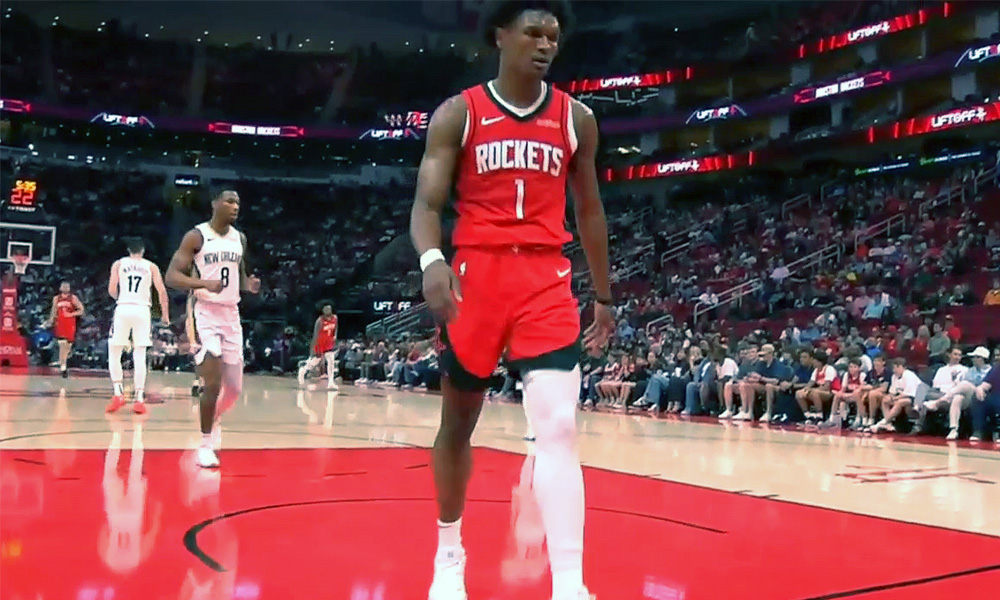
Rockets young star Amen Thompson will have his ankle injury re-evaluated in one week, according to Ime Udoka.
Thompson had an MRI on Sunday and the Rockets coach confirmed all imaging (X-ray, MRI) was negative.
“Just some swelling and pain, obviously,” said Udoka.
If you listen to Udoka, you can tell he knows how special Amen is to this team. He said the Rockets are missing a lot by not having him out there.
“Obviously, the things he does you can’t replicate,” said Udoka. “[Amen is] a guy that plays every position for us. When one goes down, he runs the point. If another is out, he runs the four.”
Amen is one of the best defensive players in the game, and as a one-on-one defender of guards/wings, he might already be the best in the league in just his second season. He’s holding his opponents to 40.5% shooting from the field, tops in the league.
“He’s a very unique defensive player,” said Udoka. “We got some guys that do some great things there, but I like to put him and Dillon on the best two usually, night to night. You got Tari and that’s a luxury as well, but the way he goes about it is different. His athleticism, size, speed, strength, shotblocking ability, steals… he’s all over the place.”
“Hard to replicate for sure.”
Amen injured his ankle late Saturday night in a blowout win against the Pelicans, but the unfortunate part was he probably should not have been on the floor in the first place.
The Rockets left Amen Thompson in the game in a blowout to get one more rebound for a triple-double and he just got injured. He's heading to the locker room with a limp. https://t.co/UBtrEpgWuU pic.twitter.com/D8GeKP8sQk
— ClutchFans (@clutchfans) March 9, 2025
The Rockets had built well over a 30-point lead by early fourth quarter. Jalen Green was able to rest the entire fourth. Alperen Sengun came out of the game with 7-8 minutes left while Dillon Brooks and Tari Eason came out with 6:00 left. But Thompson, who had posted an insane +39 on-off number, remained in the game because he was one rebound shy of a triple-double with 15 points, 11 assists and nine rebounds.
Udoka addressed that decision on Monday before the game against Orlando.
“What I typically don’t do is wholesale substitutions,” said Udoka of the decision to keep Amen in the game. “Albeit 30[-point lead] at six minutes [left] is different than losing to Minnesota, a 16-point lead with four minutes [left].”
“I’ve seen it go both ways in the past. You take out guys too early and have to bring starters back, and vice versa.”
Thompson has played in 60 games this season, five short of being eligible for postseason awards. He absolutely should be up for an All-Defensive nod this season so keep an eye on him getting back in time for that. He would need to return to action no later than April 4th for the game against the OKC Thunder in order to play enough games to be eligible.
Houston Rockets
How the Kyrie Irving Injury Impacts Rockets
Houston’s draft positioning and offseason plans could be impacted by Dallas
Published
4 months agoon
March 4, 2025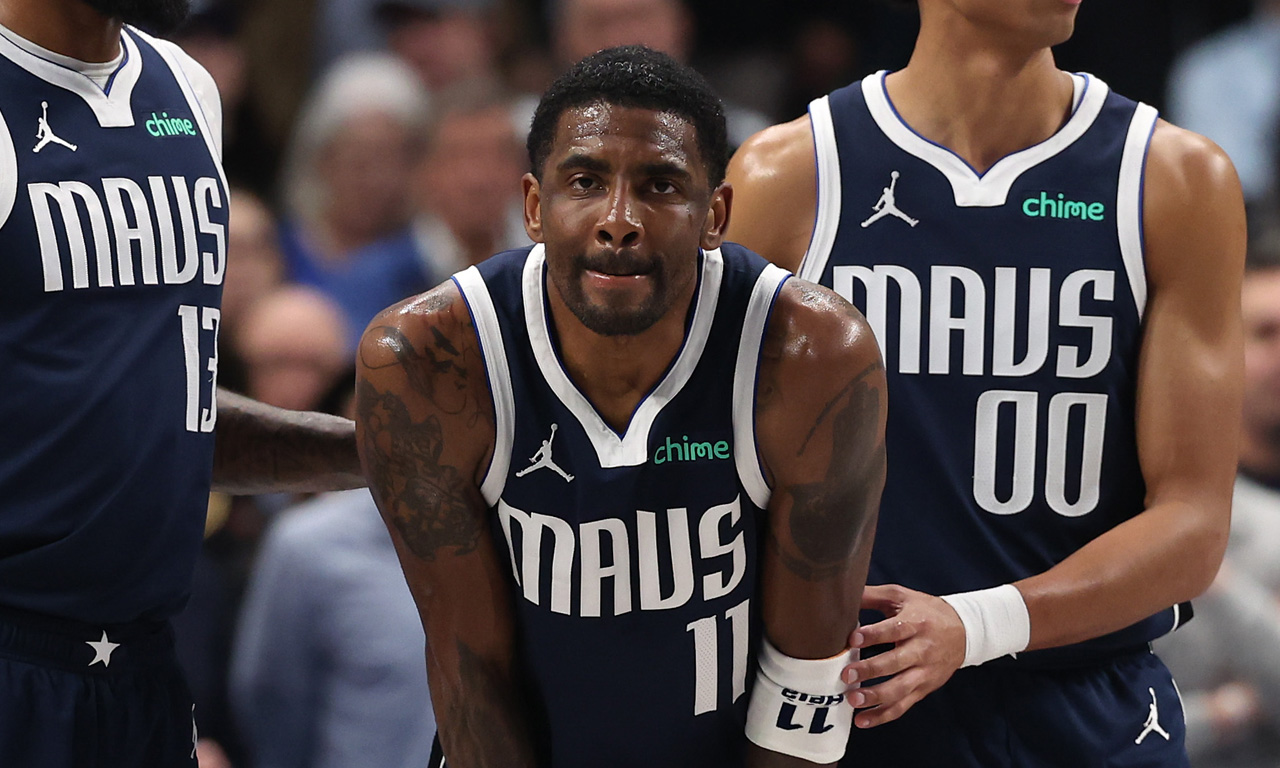
Dallas Mavericks guard Kyrie Irving was injured Monday night and the news dropped on Tuesday that the knee injury is serious — a torn ACL in his left knee that will end his season and a good portion of next season as well.
Brutal. I can’t think of an NBA team that imploded faster than the Dallas Mavericks.
You trade away a 25-year-old phenom who just hoisted you on his back en route to the NBA Finals a year ago. You cashed in that golden ticket to go all-in on a trio of aging stars in Kyrie, Anthony Davis, and Klay Thompson.
Bold strategy, Nico. Let’s see if it pays off.
(Narrator: It’s not paying off.)
The Mavericks had some interesting potential this year and maybe the next couple of years once everyone was healthy, but now? Their star guard is likely out until the calendar year 2026 and Klay and AD aren’t getting any younger nor more durable. The Mavericks may have actually swapped their future for a present that never arrives — and Dallas GM Nico Harrison has to be feeling overwhelming pressure right now.
So how does this impact the Rockets?
For starters, Houston has a game remaining on the schedule against Dallas on March 14th at Toyota Center — Davis may or may not be back for that game.
More importantly, Dallas is the 10th seed in the West at the moment, just 3.5 games ahead of the Phoenix Suns (11th seed). The Rockets control Phoenix’s first-round pick unprotected this season via a swap. We need as many West teams as possible ahead of Phoenix to keep them out of the play-in/playoffs and to push them as deep into the lotto as possible.
This complicates that. Phoenix’s remaining schedule is the toughest in the NBA by a good margin, with plenty of games left against the league’s best teams, so it still looks promising overall — but we’re talking about Kevin Durant, Devin Booker and Bradley Beal. They can still get hot at the right time while Dallas may struggle.
So keep a close eye on that. The good news is the Portland Trail Blazers are one of the hottest teams in the league and they are (shockingly) nipping at the Arizona squad’s heels.
Taking a look ahead to the offseason, the Kevin Durant Pursuit will be big.
This one is a little more complicated for Houston. The Rockets really want Devin Booker but, as of now, the Phoenix plan appears to be to trade KD this offseason and retool around Booker. The Rockets will have interest in Durant but they’re not going to sell the farm (prospects and all the picks) for a 37-year old like they would for Booker.
Three teams that I’ve heard a lot about from Rockets circles that will be in the mix are Houston, Minnesota and Dallas — Timberwolves and Mavericks have been considered the main competition. But, a lot of this will depend on Durant himself and where he wants to play at this stage of his career.
Keep in mind also, if the Suns are “retooling” around Booker and Beal (holding the no-trade clause), then they could be placing a higher priority on win-now players over the return of their own draft assets. The Rockets definitely have the best assets overall to offer up in any trade package between those three teams, but if Phoenix does prefer finding the right ready-to-win players around Booker/Beal, that gives Dallas and Minnesota a real chance.
This injury “may” take Dallas out of the equation, and they are/were definitely a contender for KD’s services given his past relationship with Kyrie and the way Dallas was positioned to win right now. Does KD at his age want to wait for Kyrie to be healthy?
And one last friendly reminder: The Rockets control that Dallas 2029 first (unprotected).
Houston Rockets
Rockets Sign David Roddy to Two-Way Contract
Former first-round pick has played with the Grizzlies, Suns and Hawks
Published
4 months agoon
March 3, 2025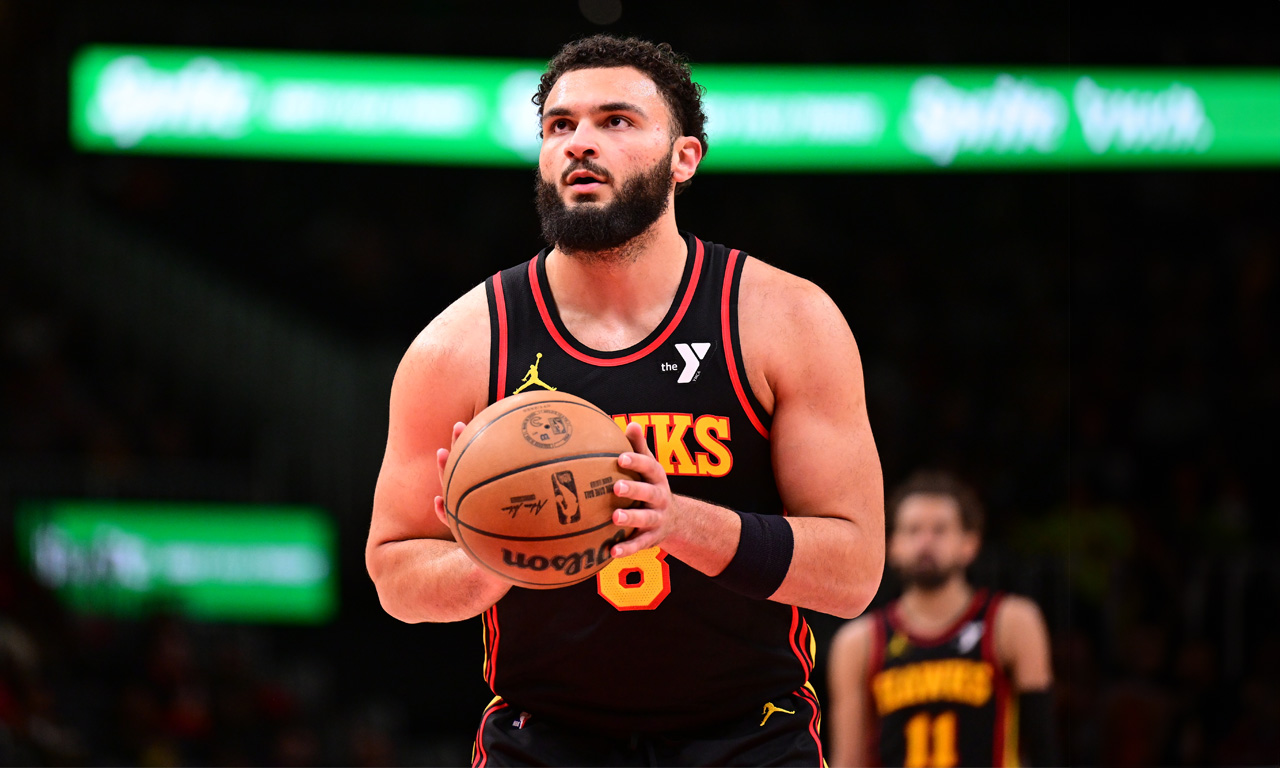
The Rockets made a move on Monday, signing former first-round pick David Roddy to a two-way contract.
The two-way spot opened up after the front office signed Jeenathan Williams to a standard four-year, $8.2 million contract (with friendly team options all along the way).
Roddy is 6-foot-5 and 250+ pounds but sports a 6-foot-11 wingspan. He was taken with the 23rd pick in the first round of the 2022 NBA Draft — six selections after the Rockets drafted Tari Eason. A standout in college, Roddy averaged 19.2 points, 7.5 rebounds, 2.9 assists, 1.2 steals, and 1.1 blocks per game during his junior season at Colorado State.
Roddy, who turns 24 later this month, is a physical player who can play multiple positions. He’s a solid rebounder for his size/position. He has played in 165 games over three seasons with the Grizzlies, Suns, Hawks and most recently Sixers, averaging 6.2 points and 2.9 rebounds per game.
The guard/forward has not shown efficient shooting, however — he’s a career 30.5% three-point shooter and just 68.4% from the line. His defense is better inside than out.
Ultimately, it will be those two things — three-point shooting and defense — that will determine his chances of carving out a consistent role in the league.
All in all, it’s a low-risk signing and the Rockets get a look at a prospect that fits their age timeline.
Houston Rockets
Houston a potential landing spot for Ben Simmons post-buyout?
Published
5 months agoon
February 6, 2025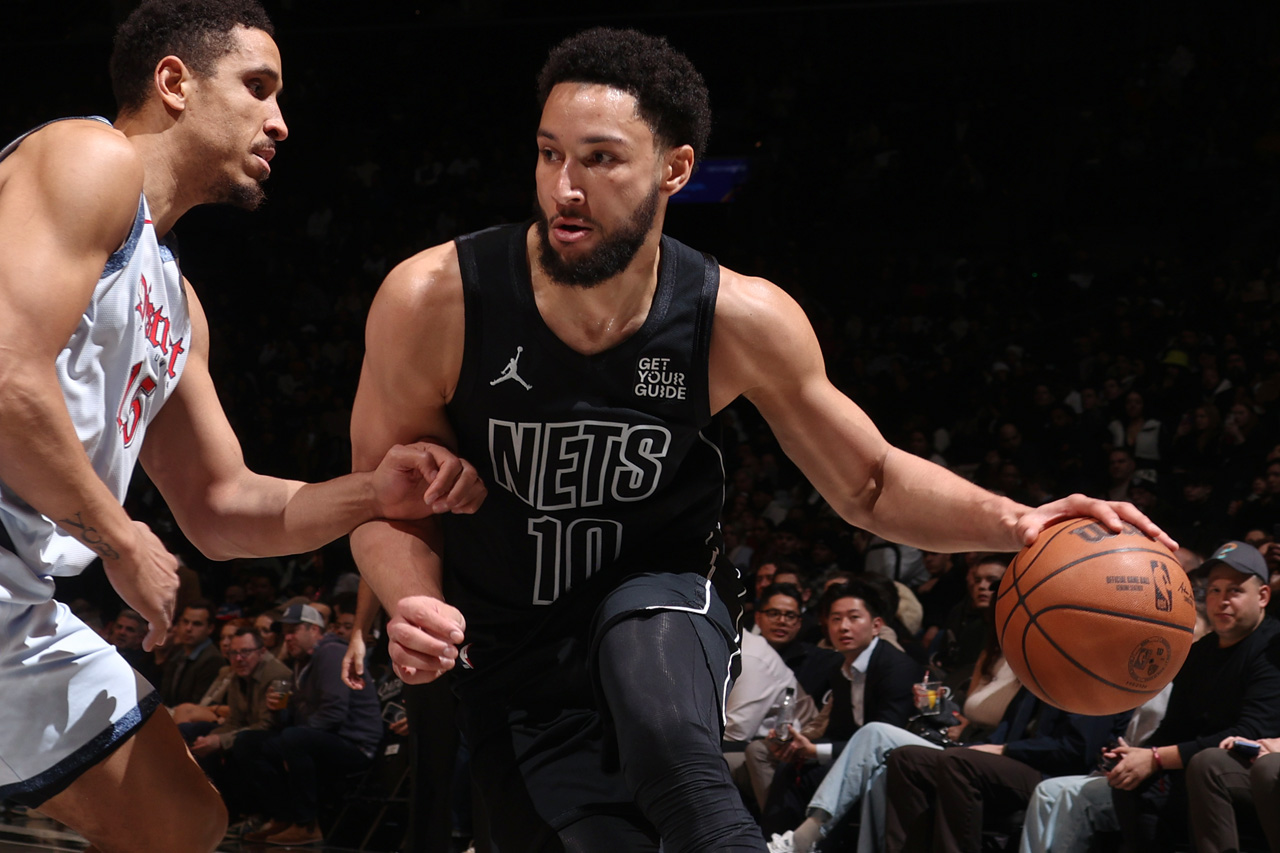
ESPN NBA analyst Brian Windhorst said on Thursday’s NBA Trade Deadline show that Brooklyn Nets forward Ben Simmons is working on a buyout and the Houston Rockets is a potential landing spot for him.
“Cleveland and Houston are two situations for Ben Simmons,” said Windhorst.
Brian Windhorst says the Cavaliers and Rockets are buyout locations for Ben Simmons.
Thoughts? pic.twitter.com/7ly4mvmxr5
— ClutchFans (@clutchfans) February 6, 2025
Advertisement
Rockets coach Ime Udoka was an assistant coach in Philadelphia in 2019-20 when Simmons was with the Sixers, before injuries took a significant toll. In fact, Udoka, when speaking about Amen Thompson earlier this season, brought up some comparisons to Simmons.
“The skill set is there, and it’s something that’s unique with his speed, athleticism, size, passing ability, and all those things,” said Udoka of Thompson. “I coached somebody, Ben Simmons, who had similar traits… as far as size and ability to push the pace, and find guys and finish. There are some similarities there.”
Both Thompson and Simmons are known for their elite athleticism, defensive versatility, and ability to create opportunities in transition.
However, can Simmons help the Rockets today? That’s the tough question.
Simmons has played in 33 games this season, averaging 6.2 points, 6.9 assists, 5.2 rebounds, 0.8 steals and 0.5 blocks in 25 minutes a night. He does not shoot threes (like, at all) — he has only attempted two threes in the past three seasons combined.
Ideally, he does not play in front of your young forwards of Amen, Tari Eason and Jabari Smith Jr. and on that basis alone, I think I would pass. But, Ime loves defensive dogs and he could use some extra ballhandling on the roster. You can see that there’s little in the way of offensive organization when Fred VanVleet is out.
There would be a comical full circle moment though if the Rockets did sign Ben Simmons, considering the Rockets were heavily criticized for trading James Harden in 2021 to Brooklyn instead of to Philadelphia for Simmons. The Rockets clearly made the right choice there.

